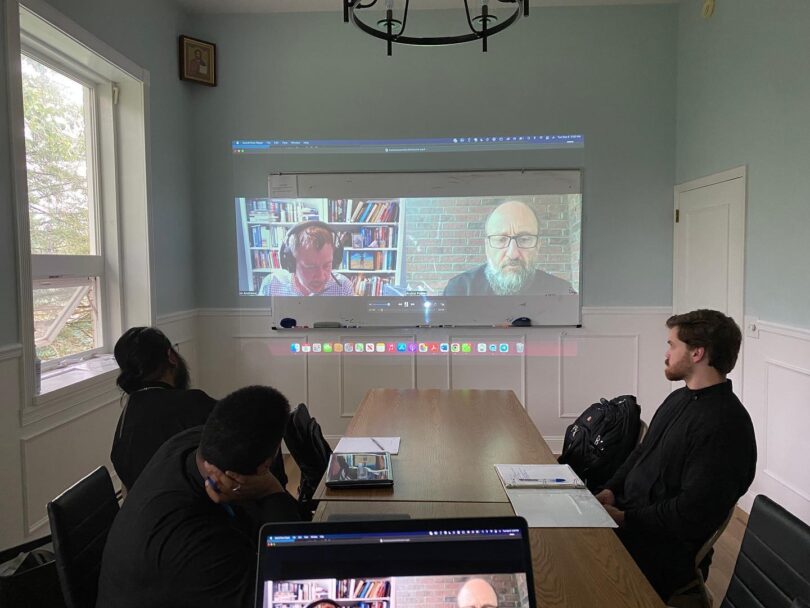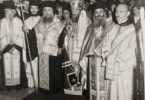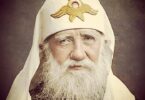Reader Tim Andrews: Okay well, thank you Fr. Andrei for taking the time to speak with me. As I mentioned yesterday, there’s a question that’s come up a lot in conversation that I think will interest your readers- it goes into a lot of your work and research on Orthodox ecclesiology, the role of the hierarchy, and what the body of the church is. I was speaking yesterday to a friend of mine who told me they had stopped going to church because of Patriarch Kiril’s position on the war in Ukraine. Now, there are a lot of questions here. I don’t want to focus on the question of how it is self-harming, cutting yourself off from the church for political reasons. I want to park that aside, as well as the political situation and who supports what. That’s been discussed. What I do find interesting though, this question has come up a lot, a reporter from the Washington Post came and interviewed me and people at my parish saying, “What do you say to all the people who don’t want to go to church because of politics?” There was a fundamental ecclesiological question about the role of the patriarch, the role of bishops, that maybe people don’t understand. When I was speaking to my friend, they essentially had this Catholic hierarchical model of the patriarch essentially being the supreme ruler, and everyone has to listen to him. If you disagree with the patriarch, you cannot be Orthodox and cannot be part of the church. So, the role of commemoration is one, but there’s this entire concept of what the church itself is and what the role of the hierarchy is that I think is worth developing so people can get your opinions on it. Essentially, in your opinion, if you ignore politics and the situation, what is your response to people like the friend I was speaking to about the role of the patriarch, the role of the church, and how it affects us in our church life?
Protodeacon Andrei: Thank you, Timothy, for reaching out to me regarding this very sensitive issue and question. Those of us who attended church yesterday heard multiple times the names of several bishops during the church service. That demonstrates our Orthodox ecclesiology that whatever a priest does, he does with a license, carte blanche, from his bishop. Priests are bishops’ hands. Bishops trust them, and they have confidence in them, but priests and deacons remember whose church it is. The church is the responsibility of the ruling hierarch, the bishop. The Orthodox Church is bishop-centered, and this ecclesiology is demonstrated through commemoration. There is a particular piece of ecclesiastical legislation, canon fifteen of the First and Second Counsel, which took place twice during the 9th century. To be precise, 861 in Constantinople. This council dealt with the aftermath of the second iconoclasm, during which the Orthodox resistance did not often have hierarchs. It took time to return to the normal order of things; monks obeyed their abbots, and church life would be regularized after the church became Orthodox once again. This canon prescribes specifically that metropolitans should commemorate their patriarchs, and [the two previous canons] that bishops should commemorate their metropolitans, and that priests and deacons should commemorate their local bishops. The only reason when this sign of subordination, this chain of command, can be broken is when a hierarch preaches heresy which has already been condemned by a council. It is a hypothetical situation, we could talk a lot about it, but I’m going to put it aside. It boils down to the point of theological divergence or opinion that would be at least very new. By theological, I mean serious stuff: teaching about the Mother of God, Christ. Very serious, heavy-duty matters. Even if this is the case, speaking of ecclesiology, we are a conciliar church. Let’s say, God forbid, something like that happened, and you’re faced with this unpleasant dilemma to stop commemorating a bishop. It’s only a temporary measure because you’re still required to bring the matter to a trial, you’re still required to further development. You only do it in emergencies, basically as a sign saying SOS. It’s not like you are done with commemoration, and then you live your happy life afterward. The Russian Church Abroad case is a very clear illustration. Sometimes there are situations for instance, the church in Ukraine faces right now, finding itself between a rock and a hard place, where they have to cease commemoration. I do believe, as time permits, they will settle their differences with the Russian Church. It might look like they’re done forever [when you stop to commemorate], but from my angle, I don’t think that will happen. I strongly believe that their leaders and bishops are church-minded people, and that’s what a church-minded person would do [to resolve a situation which led to a rupture in communion]. That’s one thing to start. Do I need to clarify anything regarding what I said or have further questions?
I think that there are several follow-up questions, but I think one of the interesting things is that there is this tendency with some orthodox which is almost like a protestant mindset, “Oh, I don’t like what this bishop has said therefore, I’ll go into schism and start my church.” Over minor disagreements, not serious doctrinal heresies. The bar to stop commemorations is high. We’ve got this western sort of jurisdiction shopping mentality in the Protestant church that potentially has infected Orthodoxy somehow. You have, in one extreme, this Catholic moral which isn’t conciliar. You’ve got the papal monarchy on one side, and on the other side, you have this sort of Protestant mentality of “oh I’ll just pick what I like. I don’t like what this jurisdiction has done, and I’ll go to another jurisdiction, and then next week another.” The actual Orthodox approach is very much a middle way between these. In terms of the commemoration of the patriarch, I think my further question is, how do you best describe the role of patriarch or first hierarch? We say first among equals- what exactly does that mean? I know we had a comment by Metropolitan Mark while we were in Serbia about his concern about the over-centralization in Moscow, and it is no longer the diocesan bishop driving the diocese, but there is a concern about over-centralization. I hope I am not misquoting.
Yes, I remember what you are referring to, you’re right.
So how would you describe the role of the ruling hierarch of an autocephalous church? How does that fit into things historically as well?
Right, I believe this primacy among equals comes from, in the Orthodox Church, like in your parish, when Fr. Victor Potapov sits in the middle of the table, demonstrating he is in charge. Let’s say a retired bishop showed up, and he would give him this seat out of respect. But normally, this primacy at the table also comes with authority. So, the Patriarch is elected by the council of the Russian Church, but at the same time, he traditionally has special authority, and his voice is special. He is not really the fourth rank of the hierarchy. In pre-Petrine Russian, they used to read the same prayer for deacon, priest, and bishop; they decided a patriarch would also need this prayer. This is why Patriarch Nikon saw himself as exceptional: he was above the other bishops. This is why he wanted the eastern patriarchs to come to Russia to try him. So, there is this tradition that the patriarch is exceptional. Nowadays we do not teach this theology, but I think the patriarch has a very exceptional role. Now we are seeing disagreement in Russian Church, not the Russian Church Abroad, but in Russian bishops, who are showing real disagreement with the Patriarch. This is not something we’ve experienced after the fall of communism, or maybe before. Because basically, patriarchs were hostages of the hostile government in Russia. Now we are having the first experience of this dynamic where bishops strongly disagree with the Patriarch, and as far as I know, none of them was penalized or punished. It is a developing story; I am a historian, and this quality requires me to be philosophical.
Because this is also relevant to us in the Russian Church Abroad because in two weeks, our bishops are electing the first hierarchs as well, and the question in the Russian church abroad, the question is how much things have been driven by the synod and how much by the first hierarch. The role of that primacy and that first among equals I know you have done a lot of research into. The differences between Orthodox jurisdictions here in the U.S treat the synod like the OCA is much more assembly driven. So, that is a relevant question. So, going back to the point of this, which is; if you have a parishioner who does not like what the patriarch of Moscow is doing, what would you tell them? If the patriarch is the symbol of unity in the Church, and someone disagrees with them, what would you tell them why that doesn’t mean they should stop going to Church?
Right. There is always a moral dimension. I understand it takes a toll on people’s consciences. I mean it, I do not mean to undermine this. I respect that for some people, it is very hard. I do not have much advice for people in Russia. I would not say you need to find an alternative Orthodox parish. I just say that it is hard. That is how the cookie crumbles. It’s a moral issue, and it’s an ethical issue. Maybe someone out of their conscience cannot go to this Church. I think this is respectful. I think this person might give an account before God if it is a genuine feeling. At the same time, if there is a feeling of superiority over the patriarch, that I am more ethical than the patriarch, then I am not sure if it is good quality. I can understand that someone out of humility, would say, “I am not judging His Holiness the Patriarch of Russian, I do not know what account he will give about his stance on this situation, but I cannot participate.” Okay, to some extent, this is humble, but I am not seeing this humble attitude. People are scandalized, basically this patriarch person who you should not rub shoulders with because he is of lower dignity than you are.
Of course, this could potentially happen.
I don’t think it is of good quality. We think about St. Maximus the Confessor, the 7th-century Byzantine saint who stood up against Monothelitism. I believe he achieved everything; he had a very focused, clean, and saintly life. For him, it was organically, realistically impossible to partake in this. For holy people like that, I respect that, I am not in a position to say anything. It was their choice; they have free will, and we all give our personal accounts about the course of our actions. They decided to do this, to not go to that church, but I have read that the patriarch scandalized somebody in some parish in the Russian Church abroad, and this person would say, “we should stop commemorating the patriarch.” Well, why wouldn’t you go out to another church? There are other options; why wouldn’t you go to the OCA quietly? Why do you want to put your parish in a schism? Because, If the parish priest decided to do this, he would put his parish in a schism. The whole Ukrainian Church is unprecedented, but it is similar to the Russian Church Abroad. We have swapped positions. We are now trying on the shoes of the Russian Patriarchal parishes in the West during the Cold war.
We now see how they dealt with this; they never ceased commemoration. In London, in other places, and in America during the Cold War. Now we are trying to see how things were from their perspective, and now in Ukraine, we see how the Russian Church Abroad was. It is a developing story, but I think intuitionally, it would be better to stick with the Church. I do not think people will be held accountable, I am not God; who am I? But I do not think Christ will ask them at the Dread Judgement: “Why didn’t you leave this Church?”. Maybe, he will ask people who are writing and doing things, I don’t know, that is my dilemma? Should I speak more? Should I be more of an activist? But I am not an activist, I am a historian, so this is the struggle I am dealing with.
Interestingly, people often think of themselves as St. Mark of Ephesus or some sort of saint in opposing things. Chances are, you’re not. Do you think you’re on the same level as one of the great saints in history? Probably not, maybe, but I don’t think we have that many people of historical, unprecedented sainthood in the united states. The other thing I would say if you were the sort of person who says you disagree with a bishop of the patriarch, shouldn’t you be praying more for them? If you disagree with the patriarch, you should pray even more for them if you are praying for the patriarch. So, the idea that if you disagree with the patriarch, so I will stop praying for him, seems contradictory to everything.
We are dealing with a modern, contemporary social phenomenon where you need to disassociate from a nasty thing. Something nasty happens, and you need to declare that you are not a part of this. Our church is guided by a Byzantine mindset and laws for better or worse. You might say this is obsolete, but this is a completely different conversation. Again, you can send your letter to Patriarch Kirill and say, “I disagree with this”, but to leave the Church over this is to bring a modern social attitude into the Church.
No, I think so. My last question, based on what I asked earlier, is about the role of the Patriarch. What authority outside of his diocese does he have? He is the diocesan bishop of Moscow outside of being the Patriarch. Our metropolitan is the bishop of New York and Eastern America, in the last case, the bishop of Australia. Outside of the diocese, other than being that symbol of conciliarity, the church itself as a body, outside of a synod of bishop, does the patriarch or metropolitan, or any first hierarch have any authority or power outside of the diocese?
I think he does.
What is that?
For the Russian Church Abroad, I like to draw a diagram where the Russian Church Abroad is a bottle. Everything that happens in the bottle is us, but the bottleneck is the Patriarch. We communicate with the rest of the Russian Church through His Holiness, the Patriarch of Russia. If a priest wants to be transferred from Russia to the Russian Church Abroad, he will go through the patriarchal office. The patriarch, head of the Moscow Patriarchate’s various departments, is setting up external policies. In our case, he is relevant. You mentioned the ever-memorable Metropolitan Hilarion, who was in charge of your diocese, of Australia, and so on, and similarly, our patriarch is in charge of his parishes in America because they do not have a permanent bishop in America, so they commemorate the Patriarch as their ruling hierarch. So, I think patriarchal status is bigger than ROCOR’s first hierarch. None of the ROCOR first hierarchs would show up or change planes from America to Australia at St. John’s cathedral without announcing his visit to the diocesan bishop. For the Russian Church abroad, it is very much the case. I believe the Patriarch would also inform, but I think the patriarch is a little closer to the idea of a universal bishop, practically in Russia. Be this as it may, our Church is conciliar. It is very important to mind this; we are a part of this conciliar Church. Every parish priest and parishioner is also a member, so weigh your options. “Okay, so you are not going to hear this name, you are not going to have all those terrible associates attached to this, you won’t have those things pop in your head anymore,” but do you want to remain Orthodox? So, what are your options? So maybe you wait and see if things are clarified, you pray for the patriarch and yourself; that is one option. Another option is to think, “Am I responsible for the Patriarch? How am I sinning for going to this Church where his name is commemorated? I think we need to ask questions like that because I’m afraid the other narrative is taken from elsewhere inside.
Of course, this is all in the context of that petition that went around a few months ago that ROCOR should just break away from the Moscow Patriarchate, which would put us in an uncanonical situation, irrespective of what you think. I think you wrote a good article, or it may have been a video, about how there is no canonical basis to just break away. In the past, when ROCOR was independent, it still considered itself a part of the Russian Church. It simply believed the Moscow Patriarch was compromised, but it never broke away. Whereas what people are calling for now- that was a very different situation, you cannot just break away and break into schism.
Yes, I think it’s problematic I do not think we have the same reason as the people in Ukraine or the Church in Ukraine, which found itself between a rock and a hard place. They were pushed to this in both directions and decided to do it. I do not think we are close to this in America, at least from what I can see.
Yeah, I think one of the lessons of history is the concept of humility in the Church and not thinking I know better than everyone else. Even if you are right, there is a virtue of humility and attending even if you disagree. This is something I think we all, myself included, lack in some ways.
Right.
This has been helpful, so thank you. I think that, which is why I messaged you yesterday, will help other people struggling with this Issue. This issue has been going on for six months now, and still, some people are struggling with these questions. I think they do need to be viewed in that historical concept of what you said that it is only forbidden- if a bishop goes into actual heresy and starts breaking fundamental dogmas of the faith, then maybe you can start commemorating them. Over politics, this is not Orthodox ecclesiology, and this is not how it works.
I hope it is valid and it doesn’t make things more complicated. Thank you for talking with me, Timothy.
Thank you as well as father, it is always good to speak to you, and I appreciate your work.
Thank you, I appreciate your attitude and help.











Re: “The only reason when this sign of subordination, this chain of command, can be broken is when a hierarch preaches heresy…” Well, there you go, then.
There are Orthodox Christians, some even within ROCOR, who believe that “Russkiy Mir” teaching (which should more accurately should be named as “Putinskiy Mir” but we’ll leave that to the historians when this heretical teaching is assigned to the dustbin of history – which by judging by events on the ground in Ukraine- should be soon) that has been embraced Moscow Patriarchate is not just “politics” but heresy.
Christ is the Head of the Church, not the President of the Russian Federation.
The practical application of this embraced heresy has been the blessing of the fratricide against our Ukrainian Orthodox sisters and brothers. One of the reasons given for this fratricidal war was that the UOC must be protected by the evil forces of the West. Well it has been “protected” all the way out of the Moscow Patriarchate. What’s the MP’s prescription for bringing them back under its administration. More bloodshed? Is the MP-Putin joint venture going to kill the UOC back into fold?
The Ukrainian Orthodox Church (UOC) under Metropolitan Onufriy not only ceased commemoration of the Patriarch of Moscow, but became independent of the Moscow Patriarchate (MP). The MP has called this state of independence an “illegal schism.” What does the ROCOR call it? The answer to this question is quite important because, as stated in this conversation, “We have swapped positions” with the caveat that unlike the MP-ROCOR relations in the past, the UOC has not broken communion with the MP.
Anyway, in my recent experience at other Orthodox jurisdictions, (e.g. Serbian, Antiochian) I’ve noticed that they do not commemorate their Patriarchate during the Divine Liturgy, but just their ruling hierarch. Are these parishes in schism from their Patriarchate? Hardly.
ROCOR must commemorate the Patriarchate of Moscow because it agreed to do so in the Act of Canonical Communion. Perhaps this is a Russian tradition where commemoration or no-commemoration of the Patriarch of Moscow is a sign of no-schism or schism?
Commemoration of the Patriarch is not a universal Orthodox Church practice so I find emphasis on this in the conversation to be a bit of a red herring. ROCOR pledges fealty to the Moscow Patriarchate in good faith and best hopes for the future and so has enshrined the practice of the commemoration of the Patriarch of Moscow. We get that. It’s a “My Church, right or wrong!’ deal.
Though brothers and sisters may leave the ROCOR for political reasons, it is not fair to characterize the leaving because of the commemoration of the Patriarch of Moscow as mostly-political (cf. the separation of the UOC from MP). They leave because the Patriarch of Moscow has blessed this fratricidal invasion of Ukraine in the name of Christ. They leave because they do not want to participate in this bloodshed and because this blessing is going to become a curse to the body of the Russian Orthodox Church.
The idolatry of nationalism has reared its ugly demonic head within the Russian Orthodox Church. It has raised its head high and proclaims a new gospel: ‘Kill and die for Russia in Ukraine and all your sins will be washed away and you will enjoy heaven with God forever.” This false gospel is being preached from the highest throne of the Russian Orthodox Church. Not one hierarch of the ROCOR has spoken up against this new heresy and so its poison is working its way through the body of the Russian Orthodox Church.
On July 19, 2023 The Union of Orthodox Journalists reported:
“According to him [His Holiness Patriarch Kirill], the patriarchate receives letters with a ‘painful question’ whether it is possible to receive communion in churches where the head of the Russian Orthodox Church is not commemorated. Patriarch Kirill stated that the sacraments of bishops and priests, who ‘do not keep this order without any scruples, remain valid.’”
See:
‘ROC patriarch says if one can take communion where he is not commemorated’
https://spzh.news/en/news/74945-roc-patriarch-tells-if-one-can-take-communion-where-he-is-not-commemorated